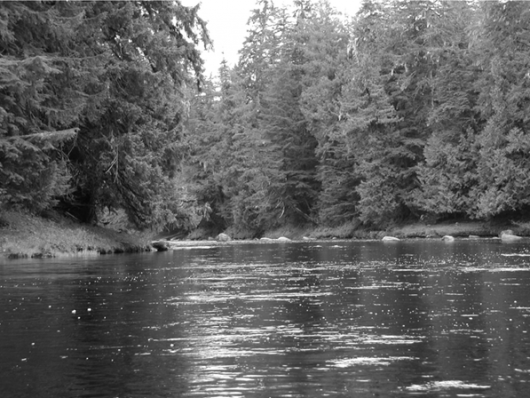
This image is from the cover of the Big Thorne Timber Sale Environmental Impact Study. (U.S. Forest Service photo)
Thursday’s Ninth Circuit Court of Appeals ruling against an emergency motion for an injunction to delay the Big Thorne Timber Sale was greeted with pleasure or disappointment, depending on who you talk to.
The Ninth Circuit’s rejection of an injunction was just the latest action related to the Big Thorne Timber Sale on Prince of Wales Island. It’s been a drawn-out process, with challenges at each stage leading up to the U.S. Forest Service’s final decision last summer to move forward with the project.
Within days of that decision, two coalitions of conservation organizations filed lawsuits in federal court to stop the timber sale, which includes about 6,000 acres of old-growth rainforest. The groups argue that it’s critical habitat for deer and wolves.
This spring, an Anchorage-based U.S. District Court judge rejected all the arguments brought forward by the environmental groups, and ruled in favor of the Forest Service. The conservation groups almost immediately appealed to the Ninth Circuit, and asked for an injunction to delay work on the timber sale while the appeal makes its way through the court.
One of the plaintiffs is Greepeace, and Larry Edwards of the Sitka-based Greenpeace office said the court’s rejection of the injunction is disappointing, although he believes the appeal ultimately will succeed.
“The difficulty, though, is that the trees can’t be put back on the stump,” he said. “So, with logging now allowed to continue until a decision is made, perhaps late in the year, unfortunately the price to be paid for the loss of habitat that’s going to occur here will ultimately fall on the deer hunters and the viability of the Alexander Archipelago wolf.”
On the other side is Tongass National Forest Supervisor Forrest Cole. He said Forest Service employees put a lot of good work into the Environmental Impact Study for Big Thorne.
“The work that’s actually done on the ground kind of gets lost with all this litigation, but there was a huge amount of work done by the two districts in order to make this happen,” he said. “I’m just pleased that they’re starting to see the results of all this labor they put together.”
Cole said the denial of an injunction indicates to him that the Forest Service most likely will continue to prevail in the lawsuit.
Edwards, though, said it’s difficult to interpret the court’s denial, because it was essentially a single sentence.
“There was a citation with that to a 2008 Supreme Court decision, which made injunctions really hard to get,” he said. “And they were never easy to get to begin with. As the courts commonly phrase it, an injunction is an extraordinary remedy.”
In its Thursday ruling, the Ninth Circuit Court of Appeals also agreed to expedite the appeal process. The schedule gives an August deadline for briefings and replies, with a decision on the appeal sometime after that.
While the two sides prepare their briefs, the Forest Service can start offering portions of Big Thorne for harvest.
There were some undisputed portions offered earlier, which Cole said likely will be logged by Klawock-based Viking Lumber this year. The rest of the acreage will need some administrative work before it can be put out for bid.
Cole was one of the defendants named in the lawsuit, along with the U.S. Forest Service in general, the U.S. Department of Agriculture andAlaska Regional Forester Beth Pendleton.
The State of Alaska, Alaska Forest Association, Cities of Craig and Ketchikan and Viking Lumber signed on as friends of the court, on the side of the defendants. Craig Mayor Dennis Watson said Monday that the denial was a big win for Prince of Wales Island.
This story has been updated to include the defendants and friends of the court.





